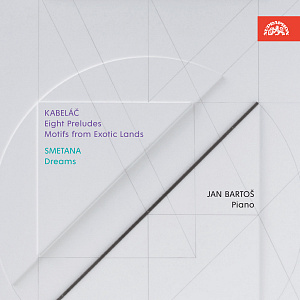
JAN BARTOŠ
PRESENTS LITTLE-KNOWN CZECH PIANO GEMS


On Friday 24 February 2023, two years after the previous disc, Supraphon will release a new album by the renowned Czech pianist Jan Bartoš, featuring Miloslav Kabeláč’s Eight Preludes for Piano and Motifs from Exotic Lands, and Bedřich Smetana’s Rêves. Following on from critically acclaimed Leos Janáček (Gramophone Editor’s Choice) and Vítězslav Novák albums, Jan Bartoš is now presenting live Kabeláč and Smetana recordings made at the Dvořák Hall of Prague’s Rudolfinum.
What do Bedřich Smetana and Miloslav Kabeláč have in common so as to feature on Jan Bartoš’s new album? Both of them were distinguished composers, conductors and pianists. Both of them created modern and timeless music for piano, which, however, remains overshadowed by their symphonic works. Smetana was writing his cycle Rêves (1875) at the time when he was completing Šárka and From Bohemia's Woods and Fields, perhaps the most remarkable of the six tone poems comprising My Country. Kabeláč was composing the two piano cycles, Op. 30 and Op. 38, while also focusing on The Mystery of Time, his symphonic magnum opus, which in recent years has been discovered by some of the world’s most renowned orchestras, in Berlin, Cleveland, London and elsewhere. Kabeláč’s life serves as a prime example of the fates that befell Czech humanists, artists and intellectuals from the 1930s to the 1970s amid the turbulent historical events. While his music garnered success worldwide, he was silenced by the Communist regime in his homeland. Kabeláč’s style evolved from complex to simple, thus in many respects ushering in the accession of post-modernism and minimalism. As attested to by his cycle Motifs from Exotic Lands, he was boldly inspired by non-European traditional music.
Jan Bartoš says of his new album: “Kabeláč’s markedly humanistically oriented oeuvre links up to Bedřich Smetana’s artistic legacy. I have always perceived the two artists as having a great inner kinship. Some of the traits they share are discernible immediately – I would recommend listening to Smetana’s Pres du chateau and then Kabeláč’s Preludio corale, or Smetana’s Tábor from the cycle My Country and Kabeláč’s passacaglia for large orchestra The Mystery of Time. Parallels can be seen in their artistic careers too. Both of them were feted composers, as well as respected conductors and pianists. Smetana was a pupil of the noted pianist and teacher Josef Proksch, whose institute Franz Liszt, Clara Schumann, Anton Rubinstein, Hans von Bülow and other globally celebrated pianists visited during their Prague concert dates. Kabeláč, for his part, attended the master class of Vilém Kurz, who studied with Jakub Holfeld, a pupil of Proksch’s.”